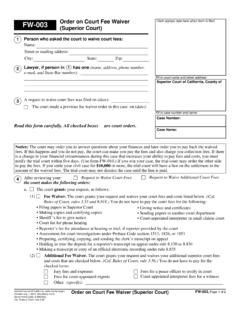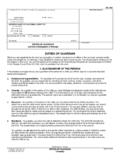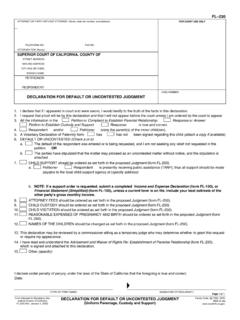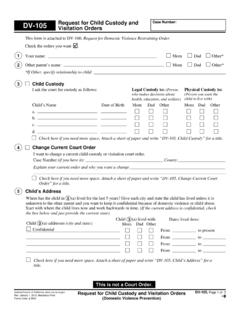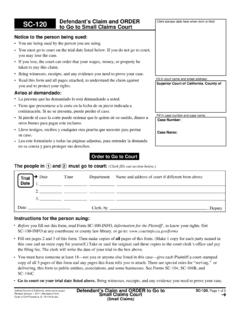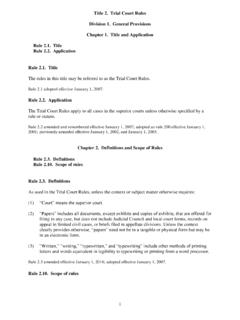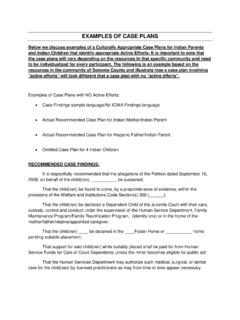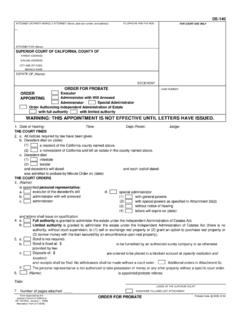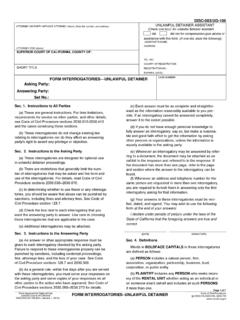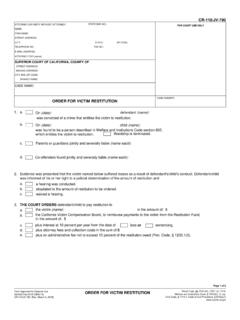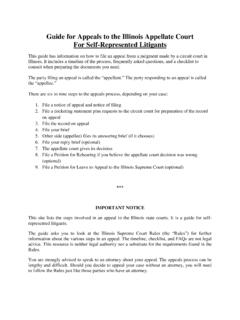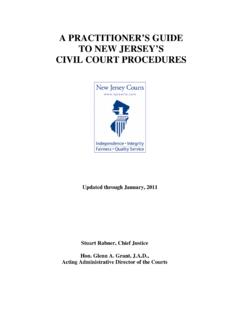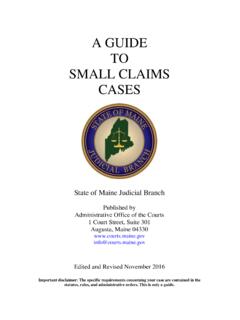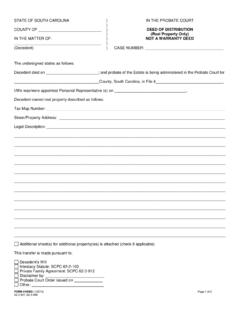Transcription of HOW TO PREPARE AND PRESENT YOUR CASE - California
1 HOW TO PREPARE AND PRESENT YOUR. CASE. SMALL CLAIMS. Your hearing will take place in a courtroom with many people who have been scheduled for that day. The judge is likely to ask that the parties first try to settle. If a pro tem (temporary). judge is taking the place of the regular judge that day, you will be asked to sign a paper indicating your willingness to have him or her decide your case or, if you are not willing to stipulate to having a temporary judge hear you case, to come back at another time. When your name is called, you and the other party in your case will move to the front of the room and tell your stories to the judge.
2 Small claims cases usually take no more than 10 or 15 minutes. It is very important that you plan ahead of time what you will say. Your story should be well organized and to the point. Do not go off on tangents, include too many details, or be repetitious. Stay calm and polite. If you are the person suing (the plaintiff ), you will speak first. Although everyone swears to tell the truth under penalty of perjury, do not count on the other party admitting fault. It is up to you to PROVE your case. Telling a story in court is not like telling it to a friend.
3 When you talk to a friend, you often start at the beginning, build up some suspense, and finish with a punchline. In court you do the opposite. You want the judge to know as soon as possible why you are there. Your opening statement should summarize the nature of your claim and the damages you have suffered as a result of injury, breach of contract, or whatever basis for your claim, why the other person is at fault through intentional or negligent behavior and why you did not contribute substantially to the loss. Examples: Breach of Contract: Your Honor, this is a matter of a painter who did not carry out his contract to pain my house after I paid him the full amount of $2,500.
4 On February 1, 2002 . Landlord/tenant dispute: Your Honor, this is a case of a security deposit of $600 that has not been returned to me although I moved out on January 1, 2002, with proper notice and left the place clean and with no damage.. Briefly give the facts, usually in chronological order. Group facts together. Instead of reciting all the dates you brought your car back for repairs, say In the 6 months between January and June of 2002, I took the car in 14 times and each time he did not adjust the carburetor.. Decide what the main points and issues are and stick to those in telling your story, referring to evidence that supports your position.
5 Evidence can include copies of contracts, estimates (you should have at least two for car repair and similar disputes), bills, photographs, diagrams (important for auto accidents), police reports, etc. If you need documents that are not in your possession, you can request them through a subpoena (Form SC-107). This is a form you get from the court clerk or SHARP, which you serve on the party who has the documents. Be selective. You do not want to overwhelm the judge with either the number or complexity of your materials. You may also bring witnesses.
6 Either someone who has firsthand knowledge of the facts ( , saw the accident) or is an expert on the subject ( , a mechanic who examined your car after it was towed). Avoid bringing friends or relatives (the judge may think they are only trying to help you) and be sure you know what to expect from your witnesses. It is not a good idea to subpoena a hostile witness ( , your defendant's girlfriend who saw him hit you may surprise you with her testimony or the mechanic who is worried about his job may change his story in court). In some cases where there are no witnesses or documents, it becomes a matter of one person's word against another.
7 The judge may be convinced by the manner of the parties that one is being more truthful, or one story may seem more reasonable than the other. Many judgments represent a middle ground, much like a compromise that could have been worked out between the parties without going to court. In planning what to say, try to anticipate and be prepared to refute what the other party will claim. In addition to explaining how the other party was at fault, you should be able to show how your own behavior was not also responsible, that you tried to minimize the loss, or, if you are the defendant, that the person suing you did not do his or her best to reduce the extent of the loss claimed by the plaintiff.
8 Example: When I broke my lease by moving out three months early, the landlord did not even try to rent the apartment to anyone else.. If you cannot express yourself in English, you should bring someone with you who can. With few exceptions, the court does not provide an interpreter and you will want to be sure the judge fully understands your story. If you know you will be very nervous and likely to leave out important facts, briefly summarize your case in writing and ask the judge to allow you to submit it before you tell your story. Be sure to have a copy for the other side.
9 You can refer to any specific laws that relate to your case. You may even PRESENT information you have received from a consultation with an attorney. Remember though, that you are not supposed to be a lawyer and it is not necessary to act like one.
